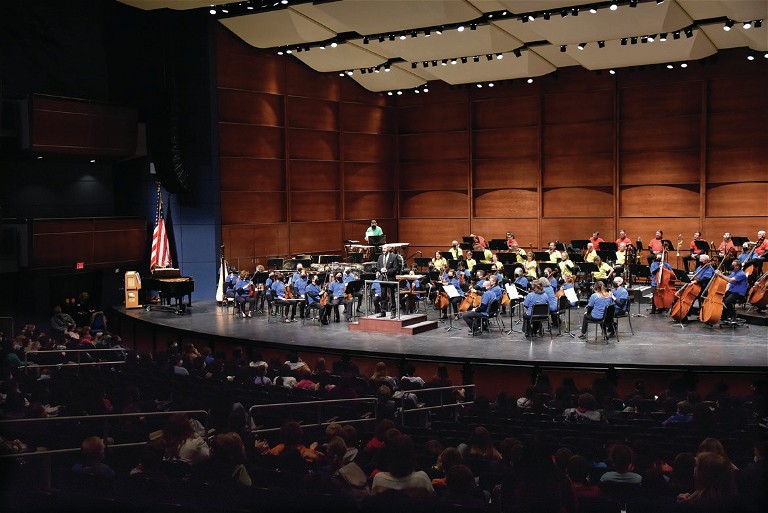FAMILY MENTAL WELLNESS
Music Heals: Positive benefits for mental health
BY DAVID DINSMORE.

OKC PHILHARMONIC CHILDREN’S CONCERT
PHOTOS PROVIDED.
Music engages 20 to 30 networks in the listener’s brain, according to the work and research of famed author and neurologist Oliver Sacks.
Local licensed and board-certified music therapist Rachel Nowels can attest to the power of music to boost mental health as she spends every day demonstrating to her patients and their families the link between the two through her work at Bethany Children’s Health Center.
Though some may conjure images of “bare feet and flower crowns” when they think of the work of a music therapist, Nowels said the position “is very nerdy” and involves a lot of research, goal assessment and evaluation. Nowels specifically works with children in a pediatric environment and focuses on helping kids with issues related to trauma and coping.
“Music is a great tool to help people understand emotions a little better,” said Nowels. “Emotions are so abstract, and kids think in such concrete terms. It’s hard for them to understand the concept of frustration or being sad. We can use instruments and different interventions to help them explore something, like what ‘mad’ sounds like on a drum.”
The power of music
During his career in music, Alexander Mickelthwate, music director of the Oklahoma City Philharmonic, has witnessed moments in which music has directly impacted someone’s health.
In one instance, an audience member at a concert Mickelthwate was conducting attended the performance with his father, who was dealing with advanced Alzheimer’s. The father’s mind cleared once the music began, and he began to converse quietly and normally with his son, with whom he had not held a meaningful conversation in some time as a result of the disease. The son told Mickelthwate that after the performance ended, he saw his dad recede back into the grips of the disease.
Mickelthwate’s son – who dealt with a mild form of Tourette’s syndrome as a young man – explored the science of the link between music and health with a project that evaluated the impact of music on the tics experienced by kids with Tourette’s.
“We start to hear music while we’re in the womb,” said Nowels, who has worked as a music therapist for 18 years with patients of all ages. “We’re surrounded by it. We don’t think about it. You’re in the car. You’re in the store. You’re watching TV. It’s everywhere. It’s something that’s part of us.”
Even the rhythm of one’s own heartbeat ties them to music, Nowels said, and there are therapeutic techniques tied to heartbeat. Research has shown steady beats can aid in physical therapy and recovery from injury as patients work on motor functions.
“The brain automatically picks up on that steady beat, and it’s a great tool for movement,” explained Nowels. “That’s why so many people incorporate upbeat music in exercising.”
Therapeutic benefits
In a clinical setting, the nature of music therapy works in conjunction with other plans of treatment patients may be undergoing to help improve outcomes across the board.
“We can come in and give them something unexpected, and by the end, they are smiling and interacting more and wanting to participate,” said Nowels. “It’s always exciting when we can find something that motivates them because in the beginning it can be kind of hard after their accident or illness to get them back up and believing that it’s going to be OK. It’s OK to smile again.”
Though the focus of much of Nowels’ work comes from the clinical realm and making sure patients are receiving appropriate therapies and plans, the impact of having a little music added to the treatment or recovery of a child resounds within the family members surrounding them.
“It can help take their mind off what they’re working on and focus on something else,” said Nowels. “It’s not clinical or nerdy to say this, but it’s good for the soul. It takes you out of your slump and lets you have a little fun. It takes you out of the bad.”
Incorporating music at home
Mickelthwate grew up listening to music at home and attending concerts, and he incorporates this in his own home with his children. For instance, when enjoying some Saturday morning pancakes his family may have Queen and the Beatles playing in the background.
“It doesn’t always have to be classical music,” said Mickelthwate.
That said, Mickelthwate suggested using soundtracks from Disney movies or composers like John Williams for those curious about adding some classical music into their rotation but unsure where to start. The familiar songs will be easily accessible for the whole family while featuring symphonic structures that can pique interest in exploring more classical compositions.
“I would start with where kids hear orchestral music, and nowadays that is usually in movies,” said Mickelthwate. “It’s a great way to get your feet wet.”
Research has shown repeatedly that in using music to help people relax, it’s best to use a genre they prefer, said Nowels. From new age to heavy metal, she has seen people able to connect and refresh with a surprising range of styles.
“Listening to music that you enjoy is a great way to make you feel better and relax,” said Nowels, who played and studied piano growing up and works as a piano teacher in addition to her role as a music therapist. “To help with your overall mental health … you can try to learn to play an instrument. It’s a rewarding, meaningful activity that you can carry on at home.”
Inspiring young musicians
Singing can also benefit one’s mental health as it usually requires purposeful breathing techniques and strengthens one’s respiratory system. This can also lead to the social aspects of music – such as joining a choir – that can create social interactions naturally around a common interest.
“With mental health, it’s important to be connected with other people,” said Nowels. “Choirs and ensembles can provide that.”
Though voice may have the easiest entry point into participating in music, the fact that voices change at different times in life – such as during puberty – can cause some disruption as people try to hone their musicality. Mickelthwate said learning an instrument can help someone achieve and maintain a consistent level of musical skill they can build upon throughout their lives. With so many online resources available – such as guitar lessons on YouTube – there are a variety of ways kids or even whole families can try their hand at an instrument or two.
“With an instrument, you can continue practicing,” said Mickelthwate, who suggested students attending schools with a music program should take advantage of that opportunity to learn and practice.
Mickelthwate enjoys when the Oklahoma City Philharmonic engages with schools and youth organizations to provide them real-life examples of people who make their living in music. They never know when they may inspire a child who wants to work in music but is not sure how to get there.

OKC BALLET'S THE NUTCRACKER.
PHOTO BY JANA CARSON.
Editor’s note: For more information about the Oklahoma City Philharmonic’s upcoming events and family-focused programming, visit okphil.org.
To learn more about what music therapists offer, visit okmedicalboard.org/search and look for licensed professional music therapists in the professions filter to find a list of those practicing in the area.
For families looking to pump up the volume on their upcoming outings, check out these music-related events in the metro:
Perfect for Littles
Nov. 26
Blue’s Clues & You! Live On Stage, Hudiburg Chevrolet Center (6000 S Prosper Blvd, Midwest City). 2pm. $43 & up. okcciviccenter.com
March 11
Acoustic Rooster’s Barnyard Boogie starring Indigo Blume, McKnight Center for the Performing Arts (705 W University Ave, Stillwater). 7pm. $20. mcknightcenter.org
Fun for All Ages
Nov. 16-Dec. 23
Lyric’s A Christmas Carol, Harn Homestead (1721 N Lincoln Blvd). Various times. $37 & up. lyrictheatreokc.com
Nov. 26
Oklahoma City Philharmonic presents Home Alone in Concert, Civic Center Music Hall (201 N Walker Ave). 8pm. $27 & up. okcphil.org